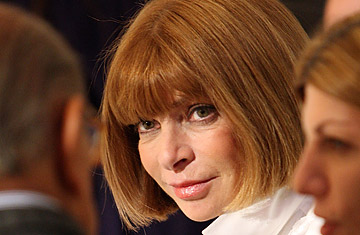
Anna Wintour
Since Jan. 1, at least six publicly held companies' CEOs have been separated from their jobs, including those from Orbitz, Borders and the world's largest meat producer, Tyson Foods. These departures were discussed in the press soberly for a day or two, the strengths or weaknesses of their replacements assessed, the impact on the share prices calibrated.
And then there's Anna.
Back in November, the New York Post's Page Six, famous for having perhaps the least onerous factual requirements of any media organ outside cyberspace, reported that Vogue editor in chief Anna Wintour might be leaving. That set off a domino chain of reports that are still tipping over three months later. The New York Times weighed in at the turn of the year, opining that Vogue had become "stale and predictable" during Wintour's 20-year reign. Overseas, newspapers and magazines from England to Thailand picked up the tale. Somewhere it acquired the too-good-to-fact-check tidbit that Wintour was to become an ambassador to France. (See the top 10 fashion faux pas of 2008.)
Of course, the press loves to eat its own. But the rumor has been given credence by Vogue's recent issues, which are skinnier than a Slavic model. The January issue has 44% fewer ad pages than the same month last year, according to Media Industry Newsletter. Wintour's detractors have always conceded that she has a firm grasp of the advertising end of the pole — if this is slipping, they ask, could she be in the endgame?
Then again, most publications are on an advertising diet. And Condé Nast's official position on Anna's employment is unambiguous. "This is something both [chairman] Si Newhouse and Anna Wintour have blankly denied," says spokesman Patrick O'Connell. But still the stories persist. Replacement names are bandied about: Carine Roitfeld from French Vogue is a favorite, with Amy Astley from Teen Vogue as a dark filly. The most recent reports are that all the rumors are merely the result of jostling during new contract negotiations between Wintour and Newhouse. (Read a 1988 TIME article about Wintour.)
Obviously, magazine editors are more fun to talk about than the people who sell chicken parts. First, they dress better. Second, while the sexiest figure poultry purveyors bring to mind is Colonel Sanders, magazine editors are embodied on screen (see Annette Bening, Candice Bergen, Vanessa Williams and, in the upcoming Shopaholic, Kristen Scott Thomas). And who can forget Meryl Streep's portrayal of a Wintoury editor in The Devil Wears Prada (whose character, by the way, managed to avert a managerial coup)? (See the best magazine covers of 2008.)
Wintour is also bigger than her larger-than-life job, the most prominent editor of her day. Part of that is the Streep effect. And part of it is because of Wintour's longevity, consistency and personal quirks. She prefers sunglasses indoors and cover shoots outdoors. Her reserved mien and decisiveness — what some call "the specificity of her vision" and others her inflexibility — have attracted fabulous nicknames like Nuclear Wintour.
Now she's in her own movie. The September Issue, an inside look at the making of Vogue's big fall issue (always its biggest) by R.J. Cutler, who made The War Room, opened at the Sundance Film Festival last weekend, with Wintour in attendance. "She's a singular figure in fashion and business," says Cutler. "And pop culture is fascinated with her. On some level, all those films about fashion editors are expressing it."
Perhaps — but what sets magazine editorship apart from almost every other profession is that its most famous practitioners are almost all women. It's the only industry, outside modeling, where females have higher profiles and are more influential than their male counterparts. So there's another reason there are so many fashion editors in movies: it's an easy shorthand for feminine power.
But where do female editors go with all that power? What's the career arc? During Wintour's time at Vogue, Tina Brown was editor of Vanity Fair and the New Yorker. She was, arguably, just as famous. Ten years later, having written a best seller, Brown is editor of an upstart website. With an office that looks onto an alleyway and a dumpster. Grace Mirabella, Wintour's predecessor at Vogue, started her own magazine, which folded 11 years later. It's hard to think of one name-brand magazine editor who has maintained her prominence or transferred her influence to a new industry after leaving the job. Male editors routinely get positions of authority elsewhere; TIME's own Henry Grunwald was appointed ambassador to Austria.
There will be a Tyson Foods after Dick Bond, a Yahoo! after Jerry Yang. But nobody knows what America's oldest fashion magazine would look like under a new eye. Even more tantalizing, what would become of Anna after Vogue?
